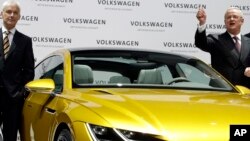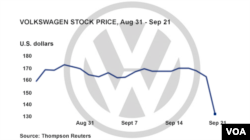Volkswagen will name Matthias Mueller, the head of its Porsche sports car brand, as its chief executive as it tries to recover from a scandal over its rigging of U.S. vehicle emissions tests, a source close to the matter said.
Mueller, 62, has been widely tipped to succeed Martin Winterkorn, who quit on Wednesday, when the German carmaker's supervisory board meets on Friday, and will take responsibility for the biggest business crisis in Volkswagen's 78-year history.
Shares in the world's largest carmaker by sales have plunged as much as 40 percent since Friday, when U.S. regulators said it had admitted to cheating emissions tests on diesel cars.
EU urges wide VW probe
The European Union urged its 28 member countries Thursday to start their own investigations into Volkswagen's fake emissions tests, with Germany's transport minister announcing that the automaker has admitted it falsified results in Europe, just as it did in the United States.
Transport Minister Alexander Dobrindt said it is not known how many of the 11 million diesel vehicles affected by the bogus tests worldwide were sold to European customers. He said cars made by other manufacturers, including Germany's BMW brand, would also be checked.
The scandal at VW, the world's largest automaker, roiled world stock markets Thursday, with key indexes falling sharply across the globe.
News agencies in Germany reported that VW plans to fire at least three key executives on Friday. Volkswagen chief executive Martin Winterkorn resigned Wednesday, saying he is taking responsibility for the “irregularities” detected in the diesel engine tests, but was “not aware of any wrongdoing.”
“Volkswagen needs a fresh start, also in terms of personnel,” Winterkorn said. “I am clearing the way for this fresh start with my resignation.” He also said that Volkswagen should continue the process of “clarification and transparency.”
Last Friday, regulators at the U.S. Environmental Protection Agency said Volkswagen had equipped about half a million diesel cars in the United States with software that switched anti-pollution controls on during tests, but shut them off during normal driving. That let the vehicles spew significant amounts of pollution into the environment.
No exit-strategy yet
Volkswagen has set aside $7.3 billion to help cover costs of the crisis, but has not announced a recall or how it plans to fix the problem.
Consumers in the United States and Europe have flooded VW dealerships with questions about repairs, whether their vehicles will lose value and whether their cars' performance will be diminished with any changes to their engines.
But the dealers, left with unsold VWs on their car lots, say they have yet to hear from VW on what repairs are needed.
In the U.S., several lawsuits have already been filed against the automaker. U.S. environmental regulators say Volkswagen faces fines up to $18 billion.
German Chancellor Angela Merkel called the VW issue "difficult" and urged the company to explain its actions thoroughly.
The deficient models include the VW Jetta, Beetle and Golf from 2009 through 2015, the Passat from 2014-2015, and the Audi A3 from 2009 to 2015.
Portions of this report are from Reuters.







